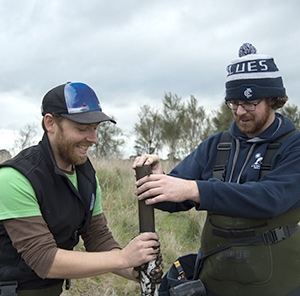Blue Carbon Lab targets climate change
Research news
Life for environmental research field workers is undoubtedly extremely satisfying, but it also requires stamina and hardiness.
Led by Deakin’s dynamic marine scientist Dr Peter Macreadie, researchers from the new “Blue Carbon Lab” have traversed the state over the past 12 months, collecting 1000 mud samples from over 100 wetlands, to identify Victoria’s blue carbon hotspots and determine priority areas for protection.
“Before this project, there was very little data about wetlands in Victoria, but now it is the most intensely sampled state in the country,” said Dr Macreadie.
“There are dots all over the map where we’ve been and taken samples - providing case study material for local and international researchers.”
He explained that CSIRO is currently analysing the 1000 samples, but preliminary findings show that a huge amount of carbon is sequestered in Victoria.
“Since Europeans arrived, we have drained over 4,500 wetlands in this state, particularly during the big agricultural boom in the early 19th century,” he said.
Carbon hotspots in the state include parts of Westernport Bay, particularly around Lang Lang, where a metre of shoreline is lost each year due to the effects of coastal development, agriculture and catchment management practices.
Parts of the Barwon River estuary show visual signs of erosion, threatening the blue carbon storage capacity (particularly for mangroves) in some areas.
Of the surveyed samples, areas around Breamlea had the highest carbon stock values, but, fortunately, these are protected as part of the Breamlea Flora and Fauna Reserve and do not appear under threat at this time.
Established in January this year, “The Blue Carbon Lab” will focus on building scientific understanding of Australia’s “blue carbon” ecosystems (seagrasses, saltmarshes and mangroves), as well as inland wetlands.
Its emergence also reflects growing recognition among scientists that blue carbon ecosystems are up to 50 times more effective than rainforests at storing carbon – and play a key role in mitigating climate change through preventing greenhouse gases from entering the atmosphere.
Based within the Centre for Integrative Ecology, the lab supports twelve researchers and focusses on four key areas: quantifying and mapping distribution of blue carbon; feasibility assessments for prospective blue carbon offset initiatives; identifying threats to blue carbon ecosystems, such as sea level rise and coastal developments; and restoring, conserving and improving management of blue carbon ecosystems.
The lab is supported by a number of sponsors, including all ten Victorian Catchment Management Authorities, Parks Victoria, The Nature Conservancy, and the Victorian Department of Environment, Land, Water and Planning.
An important focus is progressing research on the current crucial challenge for scientists in the field – determining whether creating new wetlands is beneficial or, in fact, likely to further damage the atmosphere.
“Functioning wetlands can act as sinks, storing carbon for millennia in the ground, but we have discovered that within wetlands tiny microbes – invisible to the naked eye – can release extraordinarily high levels of methane into the atmosphere through a complex process,” explained Dr Macreadie.
The lab will be working with the Intergovernmental Panel on Climate Change (IPCC) and the Federal Government on this issue later this month.
Support that will make a more personal difference to the lives of the Blue Lab researchers has come from a recent $50,000 AMP Tomorrow Grant that has enabled the team to purchase electric bikes for their field work.
“Now, we can tow our equipment around with us, so we won’t have to tramp around steamy environments in waders carrying 60 kilos of equipment on our backs,” said Dr Macreadie.
Share this story
 The Blue Carbon Lab's Dr Paul Carnell and Alex Pearse (Hons student).
The Blue Carbon Lab's Dr Paul Carnell and Alex Pearse (Hons student).
